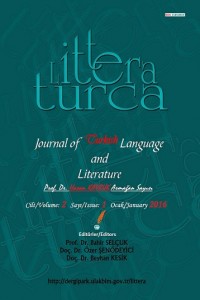KLASİK METİNLERİN DOĞRU OKUNUP ANLAŞILMASI İÇİN SÖZ DİZİMİNİN DİKKATE ALINMASI GEREĞİ: GÜLİSTAN ŞERHİ ÖRNEĞİ
Öz
Eski yazıyla yazılan klasik metinlerin yeni yazıya veya çeviri yazı alfabesine doğru olarak aktarılabilmesi için bu metinlerin hem doğru okunmasında hem de doğru anlaşılmasında etki eden ana faktörlerin başında cümlenin söz dizimi, başka bir ifadeyle kelime gruplarının nereden başlayıp nerede bittiğinin doğru tespit edilmesi gelmektedir. Eski yazıda Farsça kurala göre yapılan tamlamalarda tamlama eki gösterilmediği için iki kelime arasında tamlama olup olmadığı şeklen anlaşılmamakta, sadece anlama dikkat etmekle tamlamanın olup olmadığının tespiti mümkün olabilmektedir. Söz dizimini doğrudan etkileyen bu husus beraberinde kaçınılmaz olarak anlam bozuklukları veya farklılıkları ortaya çıkarmaktadır. Ayrıca metin doğru okunmuş olsa bile metnin anlamlandırılmasında yine söz dizimi, dolayısıyla kelime grupları devreye girmektedir. Şayet araştırıcı kelime gruplarını yanlış tespit etmişse anlam da bozulmakta, zaman zaman söylenmek istenen şeye bütün bütün ters bir şekil alabilmektedir. Bu durumlar araştırıcının metni okurken veya anlamlandırırken son derece dikkatli olmasını zorunlu kılmaktadır. Eski yazı metinlerde noktalama işaretleri bulunmadığı için konu bazen daha karmaşık bir şekil alabilmekte, metin üzerinde dikkatin daha fazla yoğunlaşmasını, dolayısıyla araştırıcının daha fazla çaba sarf etmesini gerektirmektedir. Zaman zaman uzun bir emek sarf edilmesini gerektiren bu hususlar metnin bütününde bulunsa bile yine de gözden kaçan noktalar bulunabilmekte, uzun ve yorucu bir emeğin getirdiği yorgunluk araştırıcıyı yanlışlara sürükleyebilmektedir. Bu yazıda önce genel olarak konuya ışık tutan bazı örnekler verilecek, daha sonra bu hususların Gülistan Şerhi’nde bulunup bulunmadığı ele alınacaktır.
Anahtar Kavramlar: Sûdî, Gülistan Şerhi, Söz Dizimi, Okunuş İhtimalleri
The Necessity of Syntax for Reading and Explanation of the Classical Texts: The Example of Gülistan Şerhi
Abstract
The transfer of the texts written in Arabic alphabet to transcription alphabet and understanding the accurate meaning of these texts depend to great extend to know the syntax of the language. In another word it is necessary to know from where the grammatical phrases are beginning and where are ending. In the classical texts the noun phrase or adjective clause which is copied from Persian grammar there are no the vowel “kesre”. Therefore, the researcher must be regarded the possibility of the grammatical unit and the existence of this can be known by means of considering the meaning. If these subjects that affect the syntax are not considered, there can be mistakes. Even though the text is read correctly the syntax must be considered for the correct meaning; in another word the grammatical unis such as noun phrases or adjective clauses, must be taken into account. Also in classical Turkish texts there is no punctuation in the sentence. For this reason these problem can be complex and the researcher must be concentred on the texts. Even though the researcher endeavours to study this text, there is the possibility of making mistakes, because the endeavour which is last for a long time can cause the tiredness and then the mistakes. In this article firstly the examples which point out these subjects will be given, and then it will be discussed whether there are mistakes in determining the grammatical unit in the Gulistan Şerhi.
Keywords: Sudi, Gulistan Şerhi, Syntax, Reading Possibilities
Anahtar Kelimeler
Kaynakça
- Akyüz, Kenan vd. (2000). Fuzûlî Divanı, Ankara: Akçağ Yay.
- Altuntaş, İhramcizade Hacı İsmail Hakkı (2011). Divan‐ı İlâhiyyat ve Açıklaması Tam Metin,
- https://ismailhakkialtuntas.files.wordpress.com/2011/02/tc3bcm-niyazi.pdf [erişim tarihi: 14.12.2015].
- Devellioğlu, Ferit (2008). Osmanlıca-Türkçe Ansiklopedik Lügat, Ankara: Aydın Kitabevi.
- Erdoğan, Kenan (1998). Niyazî-i Mısrî, Hayatı, Edebî Kişiliği, Eserleri ve Divanı (Tenkitli Metin), Ankara: Akçağ
- Yay.
- Ergin, Muharrem (1985). Türk Dil Bilgisi, İstanbul: Boğaziçi Yay.
- Kaya, İbrahim (2015). “Gülistan Neşrinde Esas Alınan Nüsha Müellif Nüshası Olabilir mi?”, JASS, Number: 35,
- Summer1/2015, s. 69-87.
- Kaya, İbrahim (2012). “Sûdî’nin Şerh-i Gülistan’da Şem’î’ye Yönelttiği Anlamla İlgili Eleştiriler”, Turkish Studies,
- Volume 7/1, Winter 2012, p. 1461-1488.
- Parlatır, İsmail (2006). Osmanlı Türkçesi Sözlüğü, Ankara: Yargı Yay.
- Sudî (1249). Şerh-i Gülistan, İstanbul: Dâru′t-Tıbâ′ati′l-′Âmire.
Öz
Anahtar Kelimeler
Kaynakça
- Akyüz, Kenan vd. (2000). Fuzûlî Divanı, Ankara: Akçağ Yay.
- Altuntaş, İhramcizade Hacı İsmail Hakkı (2011). Divan‐ı İlâhiyyat ve Açıklaması Tam Metin,
- https://ismailhakkialtuntas.files.wordpress.com/2011/02/tc3bcm-niyazi.pdf [erişim tarihi: 14.12.2015].
- Devellioğlu, Ferit (2008). Osmanlıca-Türkçe Ansiklopedik Lügat, Ankara: Aydın Kitabevi.
- Erdoğan, Kenan (1998). Niyazî-i Mısrî, Hayatı, Edebî Kişiliği, Eserleri ve Divanı (Tenkitli Metin), Ankara: Akçağ
- Yay.
- Ergin, Muharrem (1985). Türk Dil Bilgisi, İstanbul: Boğaziçi Yay.
- Kaya, İbrahim (2015). “Gülistan Neşrinde Esas Alınan Nüsha Müellif Nüshası Olabilir mi?”, JASS, Number: 35,
- Summer1/2015, s. 69-87.
- Kaya, İbrahim (2012). “Sûdî’nin Şerh-i Gülistan’da Şem’î’ye Yönelttiği Anlamla İlgili Eleştiriler”, Turkish Studies,
- Volume 7/1, Winter 2012, p. 1461-1488.
- Parlatır, İsmail (2006). Osmanlı Türkçesi Sözlüğü, Ankara: Yargı Yay.
- Sudî (1249). Şerh-i Gülistan, İstanbul: Dâru′t-Tıbâ′ati′l-′Âmire.
Ayrıntılar
| Birincil Dil | Türkçe |
|---|---|
| Bölüm | Makaleler |
| Yazarlar | |
| Yayımlanma Tarihi | 16 Şubat 2016 |
| Gönderilme Tarihi | 17 Aralık 2015 |
| Yayımlandığı Sayı | Yıl 2016 Cilt: 2 Sayı: 1 |
Kaynak Göster
İlgi, katkı ve desteğiniz için teşekkür eder, iyi çalışmalar dileriz.






